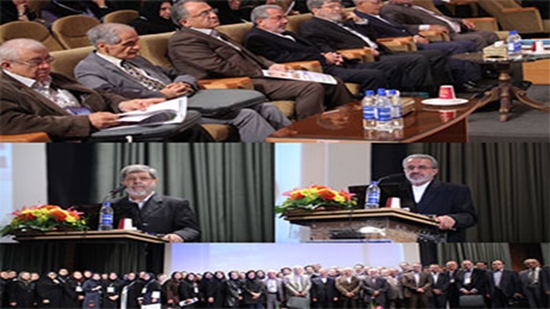The 10th international congress on endocrine and metabolic diseases

Social Relations of Shahid Beheshti University of Medical sciences: The 10th international congress on endocrine and metabolic diseases was held in Aboo-Reyhan Hall, October 22-24, 2014. This scientific event began its job in presence of Prof.Alireza Marandi, President of Academy of Medical Sciences, Prof.Naghib Zadeh, SBMU Vice-chancellor in International Affairs, Prof. Fereydoon Azizi, Director of Endocrinology Research Center, and a group of specialists. Topics for debate consisted of metabolic disorders, osteoporosis, obesity, thyroid disorders, diabetes, lipidemia, disorders ofthe pituitary gland and diseases of the adrenal glands.
Prof.Marandi, on the sidelines of the opening ceremony, stated that prevention and screening are the two most important and essential issues which play a role in promotion of the quality of health in the country which have received enough attention. On the other hand, health and treatment services have changed into a deep well for enormous costs of health which waste credit and national capital to treat diseases.
The President of Academy of Medical Sciences, having emphasized the necessity of focusing on investment in health, prevention of diseases and out-patient treatment, explained that major investments in health have to target health and hygiene, prevention and out-patient treatment in order to avoid loss of resources.
Prof.Azizi, on the sidelines of this congress, stated that activity of the thyroid gland increases in pregnancy, and released hormones from placenta stimulate its activity too. Therefore, more production of thyroid hormone in pregnancy is essential. Given the fact that much of thyroid hormone is iodine, this hormone will not be produced adequately and sufficiently if the amount of iodine in the body is low.
Prof. Azizi added that the amount of iodine intake should be doubled in pregnancy and breastfeeding due to iodine excretion in this period. He also explained that consumption of iodized salt on its own, which is a misconception, does not supply sufficient amount of iodine in pregnancy. Thus, addition of 150microgram iodine to supplementary tablets in pregnancy and breast feeding is highly recommended.
Prof. Azizi said that since the amount of iodine in salt has decreased and even some packs are devoid of iodine, health officials are highly required to supervise this issue. He added that results of several studies in different provinces have been indicative of severe iodine deficiency in seven provinces including Tehran, in particular in the southern part of the city.
Director of Endocrinology Research Center pointed out to the cause of the increase in diabetes and referred to inactivity, sedentary life style, obesity and inappropriate nutrition and diet as the most important contributing factors to diabetes in recent years. Diabetes is more prevalent in countries where people have higher average weight, but this disease is less common in developing countries where the average weight of community is normal or even lower than normal.
Having mentioned the importance of nutrition as an influential factor in diabetes, he stated that high calorie and high fat diet is known as a significant risk factor for diabetes and hypertension. Moreover, smoking is another influential factor in the incidence of diabetes, as he said.
It is notable that 64 lecturers delivered their speech on the latest scientific achievements in diagnosis and treatment of endocrine diseases, 9 of which were keynote lectures and 55 were presented in a panel and symposium by Iranian professors and 5 lecturers from Italy, Denmark, England and Germany. More than 500 participants from Iran and some from Italy, Germany, Denmark, England, Oman and Iraq attended this congress.
In the end, the Avicenna award and the Razi award were given to the best researcher in endocrinology, and the youngest researcher of Iran respectively.

Comment